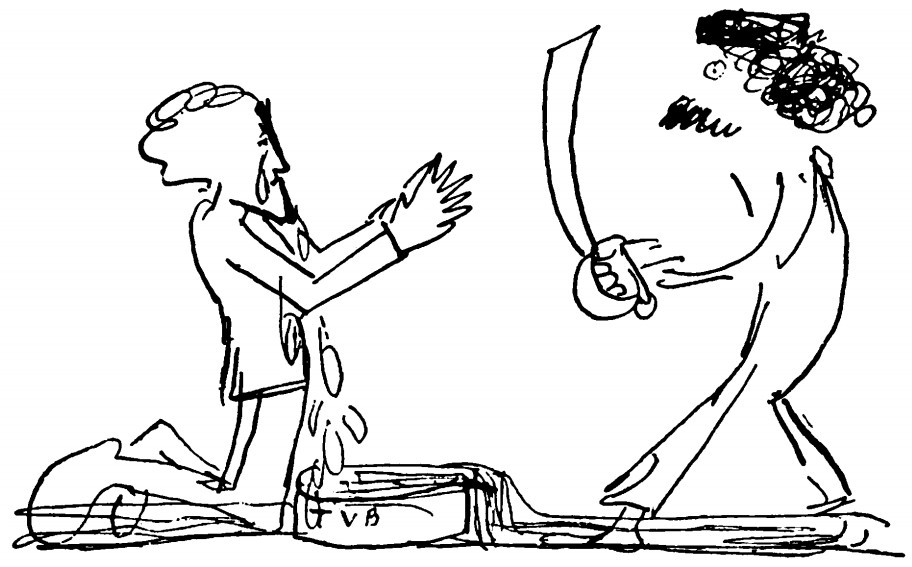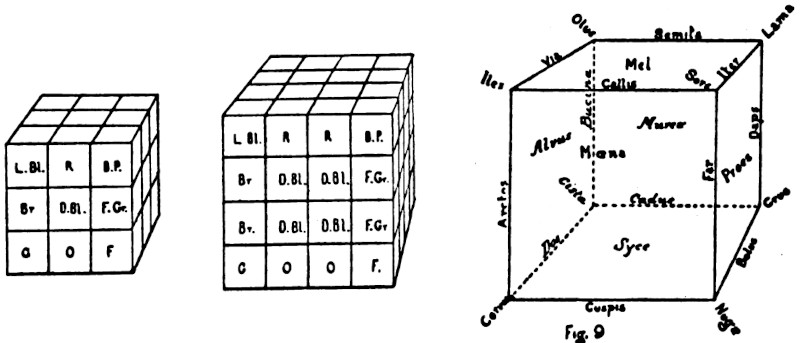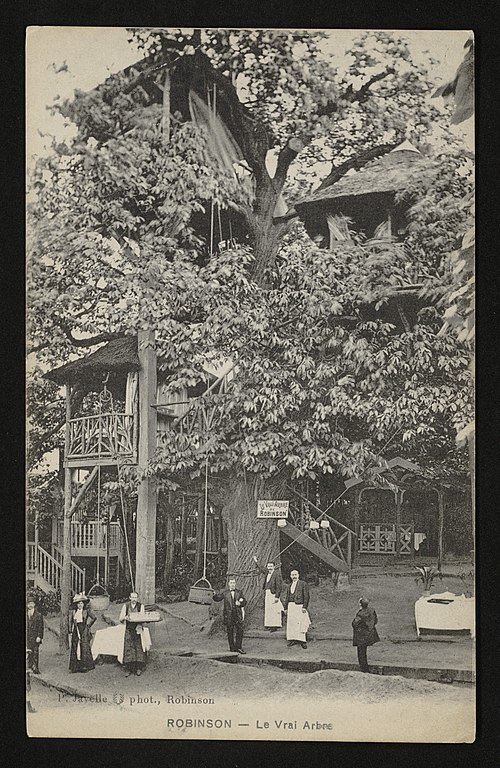
I just liked this: When Augustus Saint-Gaudens broke an engagement with Mark Twain, he sent him this wordless apology.
(From Albert Bigelow Paine’s 1912 biography of Twain.)

I just liked this: When Augustus Saint-Gaudens broke an engagement with Mark Twain, he sent him this wordless apology.
(From Albert Bigelow Paine’s 1912 biography of Twain.)

In 1880 Charles Hinton (inventor of the baseball gun) turned his attention to the fourth dimension, that unseen world whose behavior seems so baffling to ordinary thinkers.
In his 1888 book A New Era of Thought, he announced a unique way to think about it, a set of 81 colored cubes that correspond to the 81 parts of a 3 × 3 × 3 × 3 hypercube. By creating a set of wooden cubes, painting them according to Hinton’s instructions, and working through the prescribed exercises, the reader could learn to visualize the fourth dimension as intuitively as the third:
The square, in moving in the unknown direction, traces out a succession of squares, the assemblage of which makes the cube in layers. So also the cube, moving in the unknown direction, will at any point of its motion, still be a cube; and the assemblage of cubes thus placed constitutes the tessaract in layers. We suppose the cube to change its colour directly it begins to move. Its colour between 1 and 2 we can easily determine by finding what colours its different parts assume, as they move in the unknown direction.
Hinton’s method drew few adherents, but he was sure that it worked — he had proved it for himself. “The particular problem,” he wrote, “at which I have worked for more than ten years, has been completely solved. It is possible for the mind to acquire a conception of higher space as adequate as that of our three-dimensional space, and to use it in the same manner.”
He moved on to other things, but he’s left us one permanent calling card — Hinton coined the word tesseract.
In 1837 English journalist Albany Fonblanque wrote, “Sir Robert Peel was a smooth round peg, in a sharp-cornered square hole, and Lord Lyndenurst is a rectangular square-cut peg, in a smooth round hole.”
Which of these is the better fit? In other words, which is larger, the ratio of the area of a circle to a circumscribed square, or the area of a square to a circumscribed circle?
In two dimensions, these ratios work out to π/4 and 2/π, respectively, so a round peg fits better into a square hole than a square peg into a round hole.
But, strangely, Berkeley mathematician David Singmaster discovered in 1964 that this is true only in dimensions less than 9. For n ≥ 9 the n-dimensional unit cube fits more closely into the n-dimensional unit sphere than vice versa.
There’s a moral in there, but I don’t know what it is.
(David Singmaster, “On Round Pegs in Square Holes and Square Pegs in Round Holes,” Mathematics Magazine 37:5 [November 1964], 335-337.)

The wordplay journal Word Ways has made a tradition of revising the familiar rhyme “Mary Had a Little Lamb” under various constraints. Some examples:
Alliteration: James Puder, WW February 1998
Astral Aries’ avatar, alabaster “Aly,”
Ann adopted; allies are Ann and Ann’s argali.
Ann, an able autodidact, academic angst avoids;
And arch Aly’s Argus-eyed act awes astonished anthropoids.
Pangram (uses all 26 letters): A. Ross Eckler, WW February 1989
Mary had a little lamb with fleece extremely white;
Instead of grazing, all alone, the lamb kept her in sight.
It followed her to school one day, which was against the rule;
The children thought it quite a joke to view a lamb in school.
Words formed of chemical element symbols: WW February 2008
ONe TiNY AgNUS SHe NoW OWNS (SNOW-WHITe IS HEr CoAt),
WHeN HEr LaDy IS NeArBY, AgNUS STaYS, I NoTe.
In ClAsS ONe MoRn SHe TaKEs HEr PLaCe; TeAcHEr CrIEs “SHoO! RUN!”
HeAr THoSe LaSSiEs ScReAm “HoW CuTe!” ThIS AgNUS — PURe FUN!”
Four-letter words: Dave Morice, WW November 2006
Mary kept some tiny lamb with wool hued just like snow,
Each spot that this girl, Mary, went, that lamb went also (slow).
Once lamb went past home room with girl. That bent some rule last year.
This made kids loud, glad, made them play: they eyed lamb very near.
Three-letter and shorter words: Jeff Grant, WW May 2004
Amy had an ewe so wee, it was an icy hue,
And any way our Amy led, the ewe it did go too.
It ran in to her den one day (an act not in the law).
Oh, the fun for boy and gal! The ewe so wee all saw.

Samuel Pepys wrote his famous diary in shorthand, but he took a further precaution when writing about his amorous adventures — he adopted words based on Spanish, French, and Italian:
“I did come to sit avec [with] Betty Michell, and there had her main [hand], which elle [she] did give me very frankly now, and did hazer [make] whatever I voudrais avec l’ [would have with her], which did plaisir [pleasure] me grandement [greatly].”
“The garbled foreign phrases he often used for sexual incidents had something to do with concealment perhaps, much more with his pleasure in marking off sexual experiences through special words and so heightening the excitement of reliving them,” writes Claire Tomalin in Samuel Pepys: The Unequalled Self. “It is the clever schoolboy as lover, showing off to himself in two ways at once.”
In 1993, Greenland issued a 7.25-krone stamp depicting a locally fished crab that it labeled Chionoecetes oiliqo. The stamps were issued first in sheet form, but when they were reissued five months later in an eight-stamp booklet pane, collectors noticed something odd: The crabs’ Latin name had changed to Chionoecetes opilio.
What had happened? It turns out that the second name is correct; apparently during production the species name opilio had been mirror-reversed by accident. By a very unlikely coincidence, in the sans-serif typeface used all of its letters reversed into valid counterparts, producing a meaningless word that looked plausibly Latin and got past the inspectors.
The original stamps are now collectors’ items.
(Jim Puder, “OILIQO, The Looking-Glass Crab,” Word Ways 36:4 [November 2003], 243-246.)
Arthur and Robert are identical twins. One always lies, and the other always tells the truth, but you don’t know which is the liar. One day you meet one of them and want to find out whether it’s Arthur or Robert. But you can ask only one yes/no question, and the question can’t contain more than three words. What question will do? Alternatively, suppose you want to find out whether it’s Arthur or Robert who’s truthful. What three-word yes/no question will reveal the answer?
John Bevis’ 2010 book Aaaaw to Zzzzzd: The Words of Birds collects the nonsense words that birders have invented to try to convey bird calls and songs:
ag ag ag ag arr: fulmar
beesh: scaled quail
bek bek bek: red-throated loon
chack-weet weet-chack: northern wheater
djadjadja: twite
ee woomp: bittern
hup-hup-a-hwooo: red-billed pigeon
kakakowlp-kowlp: yellow-billed cuckoo
kuk-kuk-cow-cow-cow-cowp-cowp: pied-billed grebe
quickquickquickquick: cuckoo
seedle seedle seedle chup chup: hermit warbler
tiutiu-tiutiutiuk-swee: yellowhammer
trrrrk: wrentit
tzew-zuppity-zuppity-zup: rufous hummingbird
weeta weeta weeta che che che: Lucy’s warbler
wheet-tsack-tsack-tsack: stonechat
zeeda-zeeda-zeeda-sissi-peeso: goldcrest
zoo zee zoo zoo zee: black-throated green warbler
Other interpreters have used actual words — the white-eyed vireo says, “Pick up the beer check quick!”

In 1848 the French commune of Le Plessis-Piquet distinguished itself with a restaurant built in the boughs of a chestnut tree. Owner Joseph Gueusquin named it Le Grand Robinson, after the treehouse in Swiss Family Robinson.
“Word spread and people started to make the eight-mile pilgrimage from Paris,” writes Pete Nelson in Treehouses of the World. “Soon, other entrepreneurs began opening their own treehouse restaurants. At the height of its popularity, there were ten such restaurants and countless other treehouse attractions.”
The trend persisted even into the 1960s, drawing a steady stream of curious diners to Le Plessis-Piquet — in fact, in 1909 the commune officially changed its name to Le Plessis-Robinson, after Gueusquin’s pioneering idea.
As children Maurice Baring and his brother Hugo invented a gibberish language in which the word for yes was Sheepartee and the word for no was Quiliquinino. This grew so tiresome to the adults around them that they were eventually threatened with a whipping:
The language stopped, but a game grew out of it, which was most complicated, and lasted for years even after we went to school. The game was called ‘Spankaboo.’ It consisted of telling and acting the story of an imaginary continent in which we knew the countries, the towns, the government, and the leading people. These countries were generally at war with one another. Lady Spankaboo was a prominent lady at the Court of Doodahn. She was a charming character, not beautiful nor clever, and sometimes a little bit foolish, but most good-natured and easily taken in. Her husband, Lord Spankaboo, was a country gentleman, and they had no children. She wore red velvet in the evening, and she was bien vue at Court.
There were hundreds of characters in the game. They increased as the story grew. It could be played out of doors, where all the larger trees in the garden were forts belonging to the various countries, or indoors, but it was chiefly played in the garden, or after we went to bed. Then Hugo would say: ‘Let’s play Spankaboo,’ and I would go straight on with the latest events, interrupting the narrative every now and then by saying: ‘Now, you be Lady Spankaboo,’ or whoever the character on the stage might be for the moment, ‘and I’ll be So-and-so.’
“Everything that happened to us and everything we read was brought into the game — history, geography, the ancient Romans, the Greeks, the French; but it was a realistic game, and there were no fairies in it and nothing in the least frightening. As it was a night game, this was just as well.”
(From his Puppet Show of Memory, 1922.)